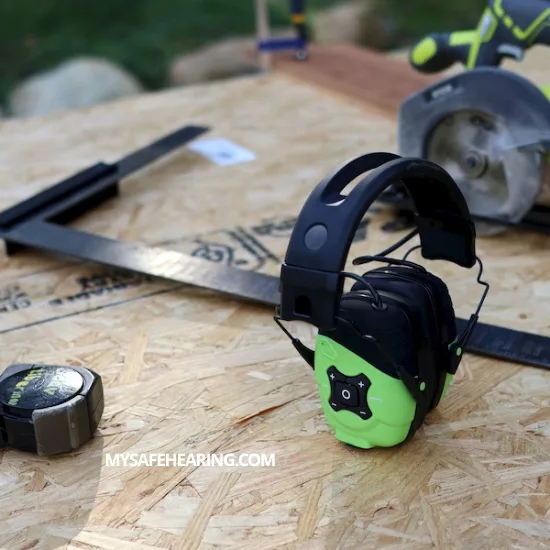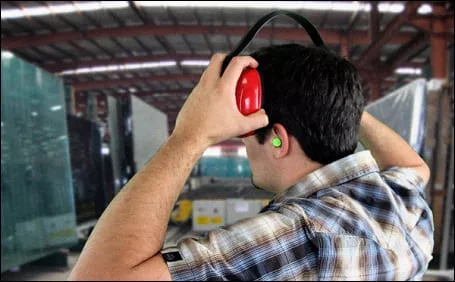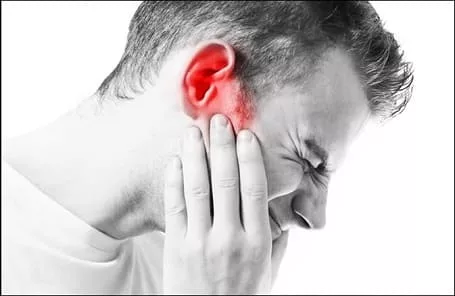
Ear protection such as earplugs and earmuffs are an incredibly effective way to prevent premature hearing damage caused by loud noises, but if they are not used properly, earplugs may do more harm than good.
A study published last year in the British Medical Journal Open found that all noise-induced hearing loss is due to high-frequency sounds rather than low-frequency sounds.
This is one of the reasons why musicians often suffer from this condition, even though they don’t work in places where they are exposed to extraordinarily loud bass noise every day. Even so, you must always wear your earmuffs when there is a risk of exposure to loud noises.
Ear plugs do not provide complete sound cancellation because people can hear muffled sounds through them, but they are still considered to be the best protection against hearing damage.
Although earmuffs effectively block out high-frequency noise by covering your whole ear, they may not fully protect you if they don’t fit right.
For example, earmuffs that are too big for your head let sound seep in from the bottom and reduce their overall effectiveness. If you have small ears, then the earpieces of the muffs must completely cover your ears for maximum noise reduction.
The most important thing is that both plugs and muffs fit correctly, so these things never come off when exposed to loud noise because even a tiny gap between any of these pieces is enough to let in damagingly loud sounds. This applies especially to plugs, as we’ve mentioned.
What if I wear earplugs and earmuffs at the same time?
 If you wear earplugs and earmuffs at the same time, but one of them doesn’t fit right, then your eardrums remain exposed to loud noises that penetrate through the openings in your hearing protection.
If you wear earplugs and earmuffs at the same time, but one of them doesn’t fit right, then your eardrums remain exposed to loud noises that penetrate through the openings in your hearing protection.
It is safe to combine both of these things that provide noise protection, but they need to be worn together and not alone because that won’t offer complete protection.
Is it safe to use earmuffs?
Even if you buy a pair of high-quality earmuffs and earplugs, do not assume they will always protect you completely against all types of sounds.
They will only help prevent damage if they fit well and are used correctly every time you need them. After all, the best way to stop hearing loss is to avoid loud noises wherever possible.
If you suffer from hearing loss caused by exposure to loud sounds, then it is a good idea to consult an audiologist.
Even if your condition isn’t serious yet, you should consider protecting your hearing at all times because even a slight degree of damage is irreversible and may eventually leave you with severe hearing loss.
How long can you wear ear muffs for?
Don’t wear earmuffs for more than 24 hours at a time because that can increase the risk of your outer ear getting too hot due to insufficient air circulation.
Also, even though you may find that some earmuffs are very comfortable, some types of muffs can become uncomfortable after long periods, depending on their design and how they fit on your head.
As with any type of hearing protection, never share it with anyone else because you don’t know where or when they last used it or what kinds of germs might be living inside.
Replacing these products every so often is also necessary in order to maintain their effectiveness against noise exposure.
Can earmuffs cause ear pain?
Ear pain is a symptom of an ear problem and not a condition, so it can be caused by anything. If you are using earmuffs to protect your ears, they will only worsen the pain if they don’t fit right or don’t make enough noise to prevent damage.
For example, even though some people use foam inserts with their muffs to further improve their ability to muffle sounds, this can be very uncomfortable if it causes air pockets inside the muffs, leading to uneven pressure on your ears.
Even though earplugs are more effective than earmuffs at blocking potentially harmful sound waves, both products can help prevent hearing loss if used correctly whenever needed.
Do earmuffs cause tinnitus?

Tinnitus (a.k.a. ringing in the ears) is not caused by hearing protection, but it can be made worse if you aren’t wearing any protection correctly or at all times when exposed to loud sounds.
It is worth mentioning that certain types of tinnitus are triggered by exposure to sound, and this includes your ability to hear your voice clearly, even though it may seem very muted compared to other people who don’t suffer from tinnitus.
According to one study, many individuals with tinnitus experience hyperacusis, which means they have unusually elevated sensitivity to ordinary every day sounds like vacuuming or using a blow dryer.
Earplugs can help reduce this sensitivity because they keep certain frequencies of noise from reaching your ears, but this may not be enough to completely stop tinnitus from developing.
Can earmuffs cause hyperacusis?
In general, earmuffs are effective at reducing sound exposure, and this includes frequencies linked to triggering hyperacusis.
In most cases, if you have been diagnosed with hyperacusis and already wear hearing protection regularly, there is no need to worry about the muffs causing more problems like they would for people who never wear anything in their ears.
However, there is a chance that using too much noise reduction (like on airplanes or shooting ranges) could make things worse, especially if you usually experience some degree of pain due to exposure to ordinary sounds.
Conclusions
Ear protection such as earplugs and earmuffs are an incredibly effective way to prevent premature hearing damage caused by loud noises. Therefore, you must always wear your earmuffs when there is a risk of exposure to loud noises.
However, if these things don’t fit correctly, then the eardrums remain exposed to loud noises that penetrate through the openings in your hearing protection, which can cause serious damage to your ears.
That’s why it’s best to combine earplugs and earmuffs together for complete protection instead of wearing either one alone.
The most important thing is that both plugs and muffs fit correctly so these things never come off when exposed to loud noise because even a tiny gap between any of these pieces is enough to let in damagingly loud sounds.